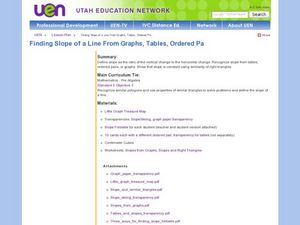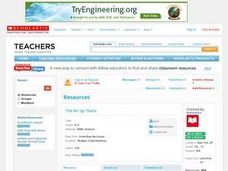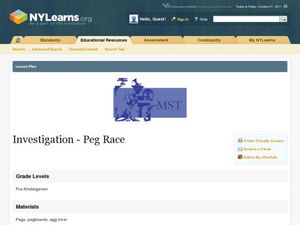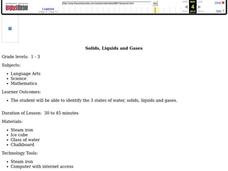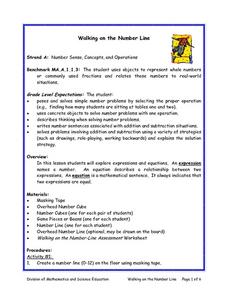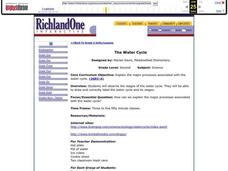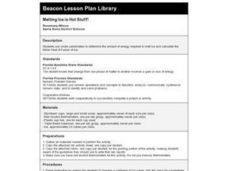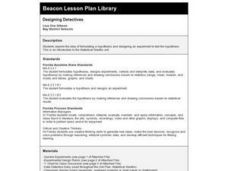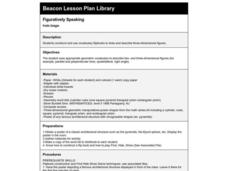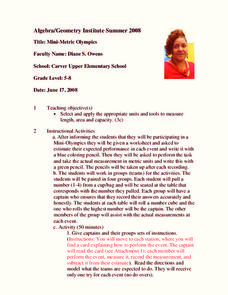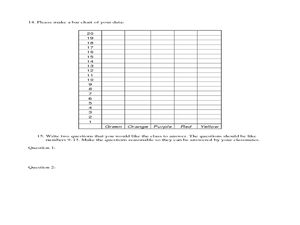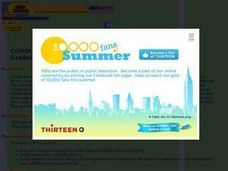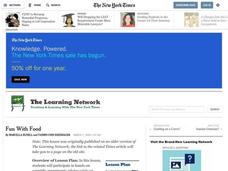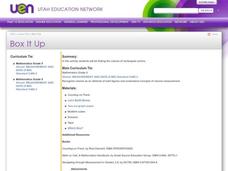Curated OER
Reaching Students through Literacy Centers
Continue the celebration of literacy this month by integrating reading centers into the classroom.
Curated OER
Bubble and Boyle
Even middle schoolers still enjoy experimenting with bubbles! They execute a series of experiments enabling them to distinguish between convex and concave surfaces, explore the properties of buoyancy, surface tension, and density,...
Utah Education Network (UEN)
Finding Slope of a Line from Graphs, Tables, and Ordered Pairs
Middle schoolers explore the concept of slope in numerous ways and start to look at simple linear equations. They describe the slope in a variety of ways such as the steepness of a line, developing a ratio, using graphs, using similar...
Curated OER
Classifying Three-Dimensional Shapes
Compare geometric solids based on their properties. Your emergent geometers use spaghetti and marshmallows to build models so they can examine the number of faces, edges, and vertices on polyhedra of their own creation. Resource includes...
Curated OER
States of Matter Lesson
Second graders identify the three phases of matter and demonstrate how a property can change states of matter. In this states of matter lesson, 2nd graders make an Ooze to discover how a solid changes into a liquid. Students...
American Farm Bureau Foundation for Agriculture
Shapes in Agriculture
It's time to get crafty with shapes! Your future farmers demonstrate their geometric ability by building a farm using triangles, circles, rectangles, and squares. But first, scholars take part in a brainstorm session inspired by their...
Curated OER
Cool Stuff
Young scientists must place a check mark next to the answer they think is correct regarding things that are warm, cool, hard, and soft. This would be a good way to begin discussing how some things actually change states of matter...
Curated OER
Picasso Portraits
Explore Pablo Picasso. For this art history and face drawing lesson plan, read a brief biography of Pablo Picasso. Draw a self portrait following guided instruction by the teacher. Paint a self-portrait and practice adding white...
Curated OER
The Air Up There
Learners observe the weather over a period of two weeks. They gather local weather data and calculate the mean and average figures from the data. They prepare a graph with their observations.
Curated OER
Investigation - Peg Race
Students explore time by comparing the duration of an egg timer with how many pegs they can put in a pegboard. They experience one on one correspondence, as they place a peg in the whole. Students discover estimation of time and number...
Curated OER
Solids, Liquids and Gases
Students explore solids, liquids, and gases. In this states of water lesson, students conduct a scientific investigation that requires them to observe and note the differences among solid, liquids, and gases.
National Council of Teachers of Mathematics
The Roll Out Fractions Game: Comparing Fractions
Reinforce the concept of comparing fractions with a hands-on, two-player game that calls for a visual model, score board, and dice. Players roll dice to acquire their given fraction, create the fraction using fraction tiles, then...
Curated OER
Walking On The Number Line
Students investigate the concepts of expressions and equations while defining the similarities and differences. They explore the operations by using a number line and record answers while working with the teacher. Students play the game...
Curated OER
The Water Cycle
Second graders conduct an a water cycle experiment. In this water cycle lesson, 2nd graders observe a puddle of water, they predict how it got there and what will happen to it. Students watch a demonstration on the water cycle and...
Curated OER
The Spider's Life Cycle
Students see that spiders have a life cycle, and reproduce by laying many eggs. We can count by ones, twos, fives, or as many as we want. They make two lists of animals on a chart.
Curated OER
Melting Ice is Hot Stuff!
Fourth graders determine the amount of energy required to melt ice using a calorimeter. They calculate the Molar Heat of Fusion of Ice.
Curated OER
Designing Detectives
Third graders explore the idea of formulating a hypothesis and designing an experiment to test the hypothesis.
Curated OER
A Plop and Fizz
Seventh graders perform an experiment to determine the effect of temperature on reaction rates. In this chemistry lesson, 7th graders take measurements and record data. They create a graph and analyze results.
Curated OER
Figuratively Speaking
Third graders construct and use vocabulary flipbooks to draw and describe three-dimensional figures. They utilize worksheets and access websites imbedded in this plan which help them construct their books.
Curated OER
Mini-Metric Olympics
Young scholars participate in a Mini-Olympics with measurements. In this measurement lesson, students throw items and predict how far they will go. They measure the actual distance and find the difference between that and their...
Curated OER
Using Ratios to Taste the Rainbow
Students solve problems using ratios and proportion. For this algebra lesson, students analyze skittles and their different colors as they apply the properties of ratios and proportions to solve their problems.
Curated OER
Conduction, Convection, Radiation, Oh My!
Learners draw a line graph, and use graphing as a tool to discover more about conduction, convection and radiation. They should design their own experiment using heat sensitive paper to show they explain these 3 processes.
Curated OER
Fun With Food
Learners participate in hands-on scientific experiments relying solely on household kitchen materials.
Curated OER
Box It Up
Fifth graders make boxes. In this prisms lesson plan, 5th graders read the book Counting on Frank and discuss the different things that the boy measures. Students make boxes of various sizes using graph paper and find their volume.




